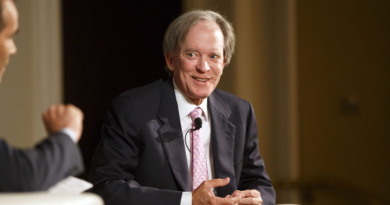‘Greedflation’ caused more than half of last year’s inflation surge, study finds, as corporate profits remain at all-time highs
“We may be looking at the end of capitalism.” Those words, from the pen of the loquacious Albert Edwards of Societe Generale, shocked the Wall Street analyst set last April and set Alberts on his way to becoming a financial press favorite for his witty turns of apocalyptic phrase. He was commenting on the phenomenon of “greedflation,” an economic bugbear previously beloved of progressive economists, not quite venerable 160-year-old French investment banks.
But after falling from its blistering pace in 2022, consumer inflation has gotten stubbornly stuck in the 3% range—rising unexpectedly for the last two months even as wholesalers’ prices stay flat or fall. That is greedflation’s music, offering a clear bit of evidence that excessive profit-taking is happening above the raw cost of goods. And yet another progressive economic study, this time from the Groundwork Collaborative, sheds light on the problem, arguing that more than half of the consumer price price increases in the middle of last year were due to excessive profits, according to the findings. Corporate profits, by the way, remain at all-time highs.
Corporate profits drove 53% of inflation during the second and third quarters of 2023 and more than one-third since the start of the pandemic, the report found, analyzing Commerce Department data. That’s a massive jump from the four decades prior to the pandemic, when profits drove just 11% of price growth.
“Businesses were really, really quick, when input costs went up, to pass that on to consumers. [But] had they only passed on those increases, inflation would have been maybe one to three points lower,” Liz Pancotti, a strategic advisor at Groundwork and one of the report’s authors, told Fortune.
Less business, more money
In fact, corporate profits have been so good, companies may have backed themselves into a corner, Bloomberg Opinion columnist (and former Fortune editor) Justin Fox opined this week, citing Home Depot’s earnings, which saw an increase in dollar sales per square foot (thanks to rising materials prices) but also fewer transactions. Corporate profits have hit a new record in the most recent quarter, while the portion of national output going to workers is still below pre-pandemic levels, despite solid real wage growth.
That high-profit, lower-volume dynamic is even hurting workers—who are being scheduled for fewer shifts to service fewer shoppers, who are themselves put off by ever-increasing prices, Bloomberg Opinion writer Conor Sen wrote. In the short term, that trend may manifest itself in some positive changes, like a four-day workweek. But in the longer term, companies will refuse to give up their fat profit margins without a fight, and will try to cut wherever possible. The tech industry, while a small part of the overall economy, is prime evidence of this dynamic, with Google, Amazon and plenty of smaller companies this month announcing plans to shed the less-profitable parts of their workforce as they pivot to the hopefully-more-profitable AI sector.
Meanwhile, consumer-facing companies have been upfront with investors about their price-raising strategies—and they don’t seem interested in a reversal. PepsiCo’s CFO Hugh Johnston said last spring the company could “increase margins during the course of the year;” construction materials giant Holcim said in October it would raise its margins to make up for falling demand, and consumer-products giant Procter & Gamble this summer boasted of an $800 million profit increase, thanks to falling commodity costs that it would not pass on to consumers.
That all adds up to consumer-inflation rates that are, well, inflated, according to Groundwork. Company profits are “probably why we saw inflation in the realm of 7% to 9% for a while, instead of the 5% to 7% range,” Pancotti told Fortune. Now that “we’re in the 3% range, if you took corporate profits away, we should already be at the 2% target” that the Federal Reserve has set, she added.
After pandemic-era upheavals, “on the whole, things are really stabilized, but we’re still seeing significant gaps between consumer and producer prices,” she said.
It’s not just the left making this argument. The Federal Reserve Bank of Kansas City has also found corporate profits playing an outsize role in price growth. The Kansas City Fed, in a recent study, found that growth in markups accounted for more than half of consumer price inflation for 2021, a “substantially higher contribution than during the preceding decade.” Last month, the largest review to date of greedflation, from the Institute for Public Policy Research and Common Wealth, looked at 1,300 companies across four continents and concluded that profiteering by a relatively small set of companies pushed up consumer prices “significantly higher” than would have happened from the supply-chain shocks alone.
Societe Generale’s Edwards, in his takedown of greedflation last year, warned that corporations’ greed could lead to a revolt and social unrest. Calling profit-taking “unprecedented” and “astonishing,” Edwards noted that he had never seen this level of corporate greed during four decades in the finance industry, and warned that popular unhappiness at companies’ “super-normal profit margins” could usher in price controls, of the type last seen decades ago.
To be sure, classical economists argue that blaming companies for trying to boost profits is like blaming the rain for falling—profit-seeking is their mission, and it was to be expected, if anything, from the unleashed pent-up demand that exploded as the economy reopened post-pandemic. But increasingly, mainstream as well as progressive economists are making the case that the prices just didn’t need to go up this much.
Outside the U.S., corporations as well as governments have pushed back against price hikes. The European supermarket chain Carrefour, which first tried to embarrass PepsiCo by pointing out price increases on its products with in-store signs, last month said it would stop carrying PepsiCo products altogether. Belgian chain Colruyt also dropped products from Mondelez, the maker of Oreos and Philadelphia cream cheese, after price hikes.




